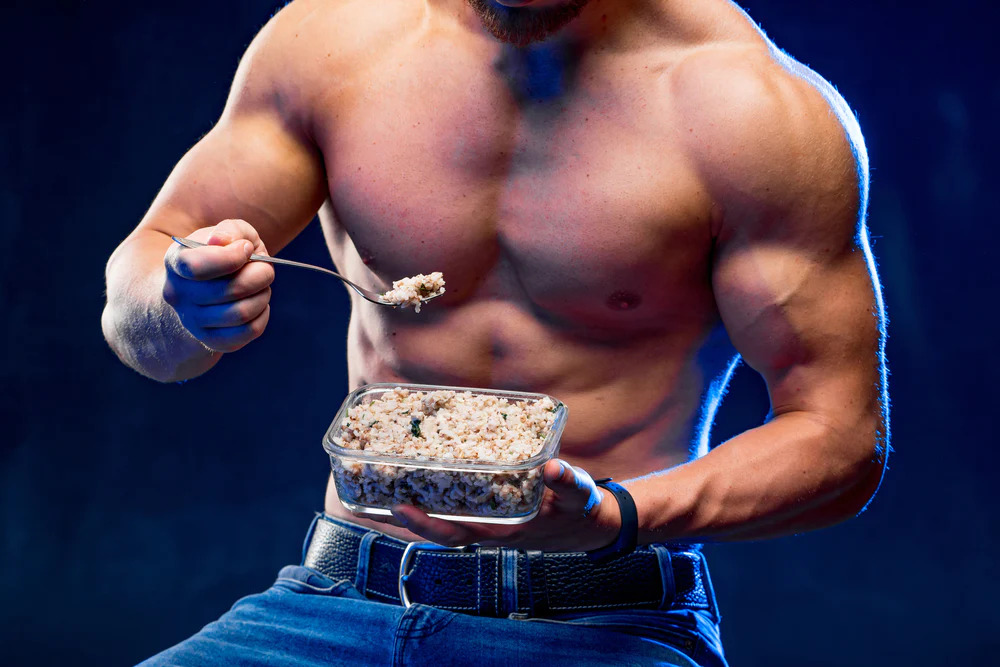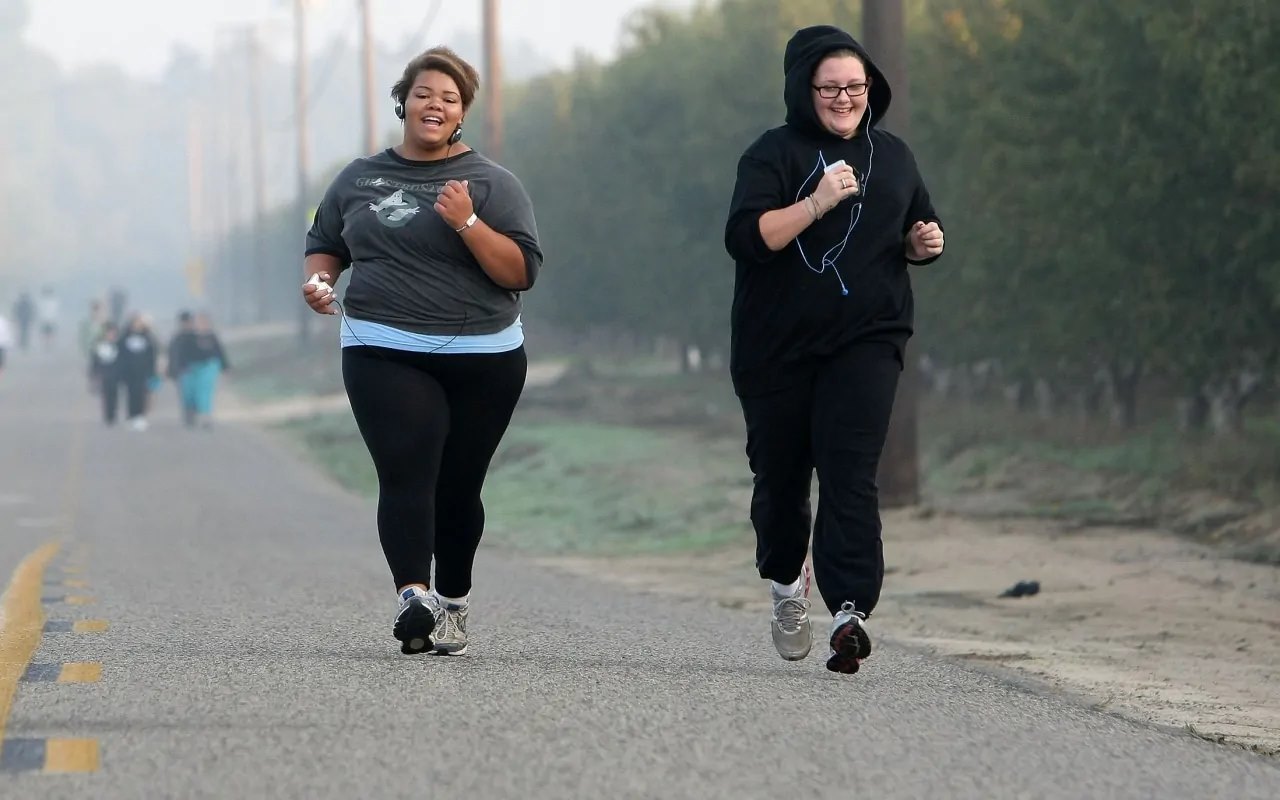Running Nutrition: Fueling Your Body for the Overweight Runner
When you're an overweight individual just starting your running journey, the intersection between nutrition and exercise may seem like navigating a complex puzzle. It's common to wonder what you should eat (and not eat) to support your running progress, especially when running for weight loss is on your agenda. In this comprehensive guide, we'll tackle the role of nutrition for the overweight runner, providing practical strategies for fueling your body, enhancing your performance, and achieving your health goals.
Can Overweight Individuals Start Running?
The question of how to start running when overweight is a common concern among those looking to improve their health through physical activity. The straightforward answer is yes, overweight individuals can certainly start a running program.
Running offers numerous health benefits for people who are overweight or obese, not the least of which includes weight loss, decreased risk of all-cause mortality, and reduced likelihood of developing cardiovascular disease. It also significantly improves cardiorespiratory fitness and muscle strength.
However, running when overweight comes with its dangers, such as a higher risk of injury. With careful planning and slowly ramping up the intensity, these dangers can be lessened.
For those pondering how to start running when obese, it might be reassuring to know that running, combined with appropriate nutritional changes, can be an effective way to commence your weight loss and fitness journey. It's all about taking that first step with the right precautions and mindset.
Breaking Down a Runner’s Diet: Basics of Nutrition
Macronutrients
Сarbohydrates: Often maligned by those on the quest to lose weight, carbohydrates are the body's primary energy source, particularly during exercise. They're crucial for maintaining energy levels, especially during long runs. Aim for complex carbohydrates like whole grains, which provide a steady release of energy.
Proteins: Vital for muscle repair and growth, proteins are key for runners to maintain and build lean muscle mass. Fish, poultry, lean meats, and plant-based sources like lentils and quinoa offer high-quality protein for muscle recovery.
Fats: A concentrated source of energy and important for hormone balance and absorption of fat-soluble vitamins, good fats like avocados, nuts, and seeds should have a place in your diet.
Micronutrients
Vitamins and Minerals: These are also essential for a runner's diet, playing important roles in performance and recovery - for example, vitamin C, which prevents oxidative stress, iron crucial for oxygen transport in the blood, as well as potassium and magnesium. Fruits, vegetables, and fortified cereals are rich sources of these nutrients.
It's all about balance. For a runner, a balanced diet consists of about 40-45% carbohydrates, 30-35% protein, and 20-25% fat, adjusted according to individual needs.
Developing an Overweight Runner’s Diet Plan
Caloric Intake and Weight Loss
Creating a calorie deficit is typically the name of the game for weight loss, but maintaining energy levels to support running is equally important. Focus on quality, unprocessed foods that keep you full and energized, which include the right balance of macronutrients.
Tip: Use an app or consult with a nutritionist to determine your unique caloric needs. Aim for a gradual, sustainable weight loss of 1-2 pounds per week, with running supporting this goal without causing excessive fatigue or hunger.
Importance of Hydration
Adequate hydration is crucial for performance and weight loss. Often, we can mistake thirst for hunger, leading to unnecessary calorie consumption. Proper hydration supports metabolism and can also help with appetite regulation.
Tip: Make water your primary fluid and drink consistently throughout the day, especially if you're running. Electrolyte solutions can be useful during particularly long runs to replenish what's lost through sweat.
Adjusting Macronutrient Ratios
Focusing on a balanced distribution of macronutrients—while keeping your caloric goals in mind—is essential for an overweight runner. Higher protein intake can support muscle retention and repair, while smart carbohydrate and fat choices will support energy levels during runs and throughout the day.
Tip: Don't be afraid to experiment and adjust your macronutrient ratios as you progress in your running routine. The ideal balance may change as your weight does and as your mileage increases.
Meal Planning and Timing for Overweight Runners

Pre-Run Nutrition: What to Eat Before a Run
Focus on a good mix of nutrients like little fiber, healthy fats, a moderate amount of protein, and a high amount of carbs. Specifically, aim for 1 to 4 grams of carbs per kilogram of your weight a couple of hours before your run. The best thing to eat before a run is granola, eggs on whole grain toast, oats, bagels, or breakfast muffins. If your run is scheduled closer, opt for lighter, carbohydrate-rich snacks that are easy on the stomach and quick to convert into energy. A banana is a great quick-fuel option.
Nutrition During Runs: What to Eat During a Long Run or Race
For runs shorter than an hour, extra fueling on the go isn't typically necessary, provided you've adequately fueled pre-run to optimize your energy levels.
However, if your runs extend beyond an hour, introducing small doses of high glycemic index (GI) carbohydrates can be critical to sustaining performance. Foods with a GI score of 70 or above, such as rice cakes, white bread, bagels, and even some sweets like doughnuts or cakes, become relevant. The goal is to ingest 30 to 60 grams of these carbohydrates per hour for runs lasting 1 to 2.5 hours.
During races or intensive long runs, increasing your intake of carb-rich foods and beverages is vital for maintaining high energy levels. It's also important in the final eight weeks leading up to a marathon to adopt this strategy more rigorously, as it can condition your digestive system and help identify what fuels work best for you. Consuming carbohydrates that are easily absorbed not only fuels your muscles but also supports brain function, allowing you to push harder and maintain focus, especially as fatigue sets in.
Post-Run Recovery Nutrition: What to Eat After a Run
Optimal post-run nutrition aids in reducing inflammation, muscle recovery, and bone strengthening. Some of the best post-run nourishments include Greek yogurt, which offers a high protein content for muscle repair; oatmeal, rich in complex carbohydrates for replenishing energy stores; and avocado toast, which provides healthy fats for overall recovery. Additional recovery foods include tofu and eggs for a protein boost, tart cherries and pineapple juice which offer anti-inflammatory properties, whey protein for muscle restoration, mixed nuts for their nutrient density, sardines for omega-3 fatty acids, and milk, which provides a balanced mix of protein and carbohydrates.
Tip: Experiment with these food options to find what best works for your body's recovery needs, keeping in mind the specific demands of your running intensity and duration.
Common Nutritional Challenges and Solutions for Overweight Runners
Overcoming Cravings and Managing Hunger
After cardio workouts like running, you might feel hungrier due to burning lots of calories. To manage this hunger without compromising your weight loss goals, aim for meals with a good mix of protein, fiber, and healthy fats to keep you full longer.
Also, keep healthy snacks, like nuts or Greek yogurt, handy to avoid reaching for less nutritious options. And remember, it's fine to treat yourself occasionally within your daily calorie limits. For example, nuts are packed with nutrients and are an excellent snack option, but they are also calorie-dense. Just control your portions to maintain a healthy balance.
Dealing with Gastrointestinal Issues During Runs
GI issues can disrupt even the best-laid running plans. Avoiding high-fiber or high-fat foods too close to a run, and gradually introducing new race fuels, can help manage this issue. Experiment with different foods and hydration levels before your runs to understand what works best for your body.
Tip: Practice your pre-race nutrition and test out different fuels during training to see what your stomach can handle.
Strategies for Meal Planning and Preparation to Stay on Track
With a busy schedule, it can be challenging to stay on top of your nutrition. Preparing meals in advance, having a meal plan, and being strategic about shopping can make a significant difference.
Spend a Sunday afternoon prepping your meals for the week, plan your runs and meals together, and shop with a list to avoid impulse buys.
Quick Tips on How to Start Running When Overweight

Preparation Tips:
- See your doctor: Before beginning any new exercise regimen, it's crucial to consult with your healthcare provider, especially to identify any potential risks unique to your health status.
- Get the right running shoes: Invest in a good pair of running shoes that offer adequate support and cushioning tailored to your foot type and running style. This can significantly reduce the risk of injury.
- Get compression gear to help with chafing: Compression clothing can help reduce chafing, a common issue for many runners, and provide support to muscles, potentially improving performance and reducing recovery time.
Fitness Tips:
- Start small and walk first: Begin with walking to gradually build up your endurance and strength. This is a gentle way to introduce your body to the physical demands of running.
- Switch to run/walk: Transition to intervals of running and walking, gradually increasing the duration of the running intervals as your fitness improves.
- Increase speed and/or distance gradually: Once comfortable with run/walk intervals, start to slowly increase either your speed or distance. Focus on incremental changes to avoid overexertion and injury.
- Listen to your body: Overuse injuries and difficulties in breathing should be addressed promptly to prevent more serious issues.
- Introduce strength training: Including strength training in your routine can improve your running performance and reduce the risk of injury by strengthening muscles, joints, and ligaments.
- Recover properly: Adequate recovery is key to preventing injury and improving performance. Ensure you're getting enough sleep, eating a balanced diet, and allowing time for your body to recover between running sessions.
Conclusion
For overweight runners, mastering nutrition is crucial. It's like juggling - requires focus, persistence, and a trial-and-error approach. Optimize your meals by monitoring what you eat, timing them well, and being open to adjustments. These changes can boost your running performance and help you reach weight loss goals.
Remember, patience and consistency are vital. Each run and meal contributes to your progress. Small decisions lead to significant improvements in health and fitness over time. Take care of yourself, listen to your body, and enjoy the transformation journey, both on the road and at the dining table.
FAQs: Running Diet & Nutrition
What does running do for your body?
Running is an effective form of cardiovascular exercise that improves heart health, aids in weight loss, strengthens muscles, and enhances mental wellness. For overweight runners, it can be a pivotal activity in developing a healthier lifestyle, increasing endurance, and building a positive runner's physique.
Is running good for weight loss?
Yes, running is an excellent exercise for weight loss as it burns significant calories, builds muscle that boosts metabolism, and can be easily adjusted for intensity and duration. When combined with a healthy diet, running can facilitate a caloric deficit necessary for weight loss, making it an essential component of a runner's diet plan.
How much should I run to lose weight?
The amount of running necessary for weight loss varies by individual, depending on factors like current weight, diet, pace, and frequency of runs. Initially, running 1-2 miles a day can be a good start, gradually increasing mileage as fitness improves. Consistency and a balanced runners diet play key roles in achieving weight loss goals.
What to eat before running?
Before a run, opt for a meal or snack that is high in carbohydrates, moderate in protein, and low in fat to provide you with sustained energy. Examples include a banana with peanut butter, oatmeal with berries, or a slice of whole-grain toast with avocado. It's crucial for your runners diet to fuel your body correctly to optimize performance and prevent fatigue.
What to eat after a run?
Post-run, focus on foods that assist in recovery by replenishing glycogen stores and repairing muscles. A combination of carbohydrates and protein is optimal, such as a smoothie with fruit and protein powder, a turkey sandwich, or yogurt with granola. Proper nutrition for runners aids in recovery and prepares your body for the next workout.
How long should I wait to run after eating?
It's generally recommended to wait about 1-2 hours after eating a large meal before running to allow your food to digest. For smaller snacks, waiting 30 minutes should be sufficient. Listening to your body is important; some individuals may need more or less time based on their own digestive comfort.
Foods to avoid when trying to lose weight?
When focusing on weight loss, it's best to avoid high-calorie, low-nutrient foods such as sugary snacks, fried foods, and processed items. These foods can hinder your progress by contributing to a caloric surplus without satisfying hunger effectively. Stick to whole, nutrient-dense foods that support your running and weight loss goals.
Best foods for runners?
Runners benefit from a diet rich in carbohydrates for energy, lean proteins for muscle repair, and healthy fats for endurance. Foods like whole grains, fruits, vegetables, lean meats, fish, dairy, and nuts should be staples in a runner's diet plan to support overall health and performance.
What to eat the night before a long run?
The night before a long run, focus on eating a carbohydrate-rich meal to maximize glycogen stores. Examples include pasta with a light sauce, chicken with rice, or quinoa with vegetables. Avoid high-fat and spicy foods that can disrupt sleep or digestion.
How many calories do you burn running a marathon?
The number of calories burned running a marathon varies depending on factors like weight, age, sex, pace, and efficiency. On average, runners burn about 100 calories per mile.
How many calories does a 2-mile run burn?
A 2-mile run typically burns between 160 to 300 calories, depending on your weight, pace, and running efficiency. Incorporating running 2 miles a day as part of a consistent exercise routine can contribute significantly to a caloric deficit and weight loss over time.
EXPLORE POPULAR ARTICLES
-
Running Glossary: Terms & Slang Every Runner Must Know
Aug 26th 2024When you dive into the world of running, you'll quickly notice that it has its own unique vocabulary
-
Best Leather Walking & Running Shoes and Sneakers
Jul 29th 2024Are Leather Running Shoes Still a Thing? You might not have realized it, but leather runnin
-
How to Break In Running Shoes [Expert Guide]
Jun 20th 2024It's rare when a couple of short walks around the block is enough for a runner to break in a new pai





![How to Break In Running Shoes [Expert Guide] How to Break In Running Shoes [Expert Guide]](https://cdn11.bigcommerce.com/s-eeul26hjka/images/stencil/160w/uploaded_images/how-to-break-in-running-shoes.jpg?t=1718884434)